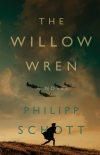The Willow Wren by Philipp Schott (electronic book reader TXT) 📗

- Author: Philipp Schott
Book online «The Willow Wren by Philipp Schott (electronic book reader TXT) 📗». Author Philipp Schott
Felix and one of his henchmen dragged Ernst into the bathroom after lights out. He squirmed and wriggled a bit in a vain effort to get away but did not protest loudly. I saw this as it was a full moon and we did not have proper blinds. Several other boys saw this too. None of us moved or said anything. This was followed by some muffled but harsh-sounding talking from behind the bathroom door, and then silence for a moment before a long period of quiet sobbing. Several minutes later the three of them emerged from the bathroom. Ernst was walking very slowly with his legs stiff and slightly apart and then climbed gingerly into his bunk. He did not cover himself with his blanket and continued to sob quietly for as long as I was still awake, and presumably for long after that.
The next morning it was like the chirping of a flock of sparrows whenever Ernst or Felix and his henchmen were out of earshot. Rumours zipped around, overlapping each other and creating a confusion of theories. The dominant theory involved the broomstick and made my mind go blank. I suppose I had some theoretical understanding of what was being discussed, but I could not begin to properly imagine it.
I know that I should have comforted Ernst that night, but I did not. I know that I should have told Herr Tischendorf the next day, but I did not. I should have written to Papa and asked him to use his status in the Party to discipline Felix, but I did not. I was afraid for my own safety and I was ashamed by what I now understood might have happened, as if acknowledging that I knew such things could exist in the world would somehow taint me.
Chapter Fifteen
Spring 1944
Spring is ever the season of hope. Even in the KLV-Lager. Personally I hoped that spring would bring the birds back. There were very few winter birds around the camp, but surely we would see more as the weather warmed and the snow receded. The camp also generally buzzed with renewed hope as the Völkischer Beobachter (“People’s Observer”), the official newspaper of the government, ran optimistic article after optimistic article. Of course they did this 365 days a year, but in spring there was a greater emphasis on the prospects for victory. The more enthusiastic among the Hitler Youth would read the exciting headlines out loud at breakfast. “The Plutocrats Promise a Trail of Death in Southern Italy!” and “The Kremlin Wants to See English Blood!” These are the more obtuse examples, but it was explained to me that the first article was about how Allied troops were deliberately spreading terrible diseases like typhus in the parts of Italy they now occupied and that, to their surprise, this was greatly stiffening local resistance to them, and the second article was about how Moscow was scornful of its supposed allies and hoped that Germany would invade England.
This was a constant theme — that the Soviets and the British and Americans were not natural allies and would soon go to war against each other. Germany would side with the latter as the Anglo-Saxon Warmongers and Gangsters were generally felt to be our estranged cousins, whereas the Bolshevik Hordes were viewed as barely human. Other headlines were more straightforward: “Göbbels’s Speech in Salzburg on Our Chances of Victory!” and “Führer Celebrates Five Years of Bohemia Back in the Reich!” None of it interested me much. I did want Germany to win, for selfish reasons of self-preservation as much as anything, but I treated the details of how that was going to be achieved with a mixture of boredom and bewilderment.
Felix became optimistic as well. With the melting of the ice and the lengthening of the days, much longer marches were deemed feasible. By late March he had been in charge of us for a month and felt that the tougher discipline and extra drills had strengthened us to the point that we could consider twenty-five or even thirty kilometres. I viewed this as the lesser of numerous evils. The mock combat, and the trench digging, and the obstacle courses were much more stressful and difficult. Now that the weather was better, I optimistically viewed a “march” as essentially a hike. It was a very long hike mind you, and one during which we were required to sing patriotic songs,





Comments (0)